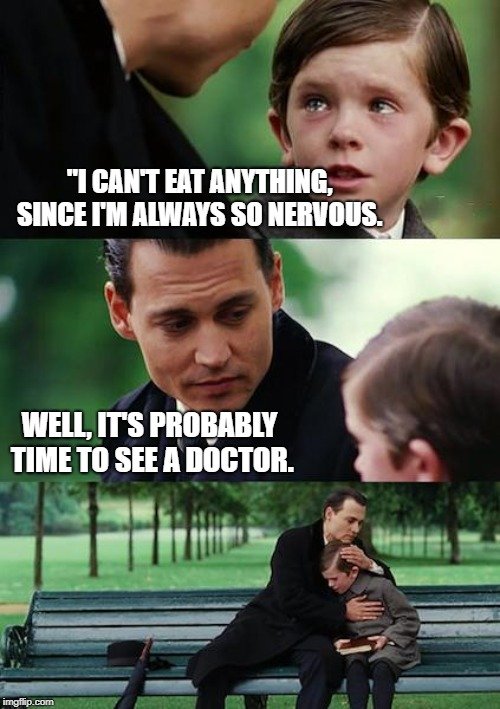Table of Contents (click to expand)
When we experience anxiety, our sympathetic nervous system is activated and initiates the fight-or-flight response. This response is a host of physiological changes that prepare us to either fight or flee. One of the effects of the fight-or-flight response is that blood is redirected away from the stomach to the muscles. This can cause the stomach to feel like it is “dropping.”
We all know the feeling we get when someone we’re attracted to walks into the room. It is similar to the one we get minutes before we have to give a big speech or when we see the flashing lights of a police car in the rear-view mirror.
We run into countless such scenarios in life that give us reason to be nervous. Not only does this mess with our minds, but the anxiety and nerves also affect us physically. Sweaty palms and an increased heart rate are common symptoms, but have you ever felt your stomach “drop” during a terrible case of nerves?

It can come on fast and strong as if the stomach has plummeted to your feet. It is one of the clearest signs that our nerves are taking over. But why would anxiety make you feel your stomach ‘drop’?
The answer is, in fact, quite simple and relates directly to our sympathetic nervous system, or more specifically, to our body’s fight-or-flight response.
The Fight-or-Flight Response Is Initiated When We Get Anxious
A universal thing among all life is the natural instinct for self-preservation. In humans and many mammals, this self-preservation manifests itself as the fight-or-flight response.
Driven by the sympathetic nervous system, the fight-or-flight response is a host of physiological changes that prepare us to, as the name implies—either fight or flee. It can occur in the blink of an eye as the brain detects danger and releases a flood of hormones and neurotransmitters such as adrenaline and cortisol into the body.

The hormones have a wide range of effects, such as increased heart rate, faster breathing, muscle contraction, narrowing the visual field, and sweat release. Your senses may grow acute, such as a peak in your hearing or smell.
All these physiological changes occur because your brain has detected a threat and is preparing to defend itself. This particular set of responses in humans has probably evolved to cope with the threats that prehistoric humans faced.
Hunting dangerous animals and surviving in the untamed wilderness a few hundred thousand years ago was not an easy task; constant vigilance was needed. It was also vital to run fast and fight hard. Our fight-or-flight response likely developed over thousands of generations of natural selection, wherein those who had better fight-or-flight behaviors had better fitness and were, therefore, more likely to pass on their genes.
Hundreds of thousands of years later, we no longer have to run away from predators, but our bodies have retained the fear response of our hunter-gatherer ancestors. Today, our fight-or-flight response acts up at the thought of failing an exam or losing our job or walking down a dark alley; our body’s reactions won’t be much different than they were back in our prehistoric days.

Also Read: Why Do We Get Nervous?
The Link Between Fight-or-Flight Response And The Stomach Drop
The blood in the veins and other blood vessels carries oxygen throughout the body. When an organ is in normal use, it receives its normal amount of blood, or even more than usual, in transient activities such as exercise or digestion.

But during our fight-or-flight response, our blood moves into organ systems that are essential for defense, attack, intense movement, and exertion, such as our muscles.
Digestion isn’t a priority for the body during what it experiences as impending doom. So the body puts it on hold. As the blood rushes away from our stomach, it can feel as though our intestines are falling.
Additionally, when we are swept along by a wave of nerves and the hormones begin to course within our bloodstream, our muscles contract, including those in our core. Combine the effect of tense muscles with the rush of blood away from the digestive system, and we experience everything from “butterflies” to “an anchor”.
Interestingly, when we experience a prolonged period of anxiety, a few other changes can occur in our stomachs. As we tend to breathe heavily when we are nervous, we take in more oxygen than we need into our gut. As a result, we may experience flatulence, which can also cause the stomach to feel a bit bloated as if the bottom is lower than normal!
A Final Word
Although it may feel strange to have the bottom suddenly “fall out” of your stomach, there is no inherent danger in this sensation. However, in some cases, the nerves can go so far as to cause nausea, dizziness, or vomiting, in which case it should be taken more seriously. If you are constantly suffering from a “funny stomach” or perpetually feel ill at ease, you may be dealing with a chronic anxiety disorder that should warrant a visit to a professional.

Feeling your stomach drop when you get nervous is one thing, but persistent digestive or gastrointestinal problems resulting from stress and nerves can have long-term negative effects on your health. Be careful–and be well!
Also Read: Why Does It Feel Weird In The Stomach When We Are Hurt Emotionally?
Do you remember why your stomach drops when you’re anxious?

References (click to expand)
- McCorry, L. K. (2007, September). Physiology of the Autonomic Nervous System. American Journal of Pharmaceutical Education. American Journal of Pharmaceutical Education.
- Chrousos, G. P. (2009, June 2). Stress and disorders of the stress system. Nature Reviews Endocrinology. Springer Science and Business Media LLC.
- The Fight-or-Flight Response :: CSHL DNA Learning Center. Cold Spring Harbor Laboratory
- Understanding the stress response - Harvard Health. Harvard University
- Object moved. The American Psychological Association
